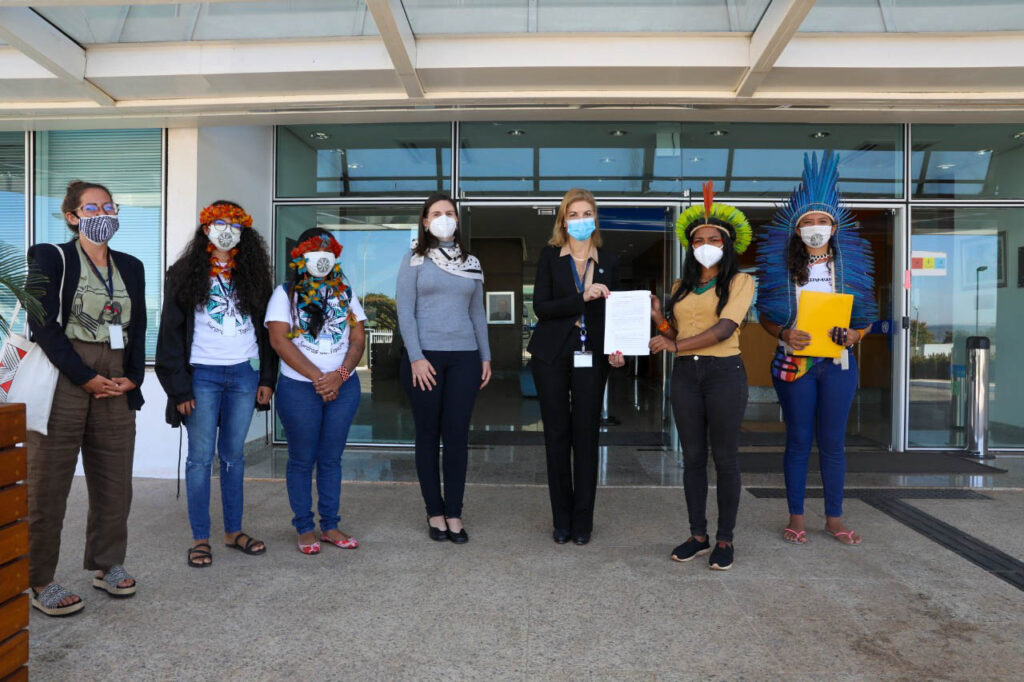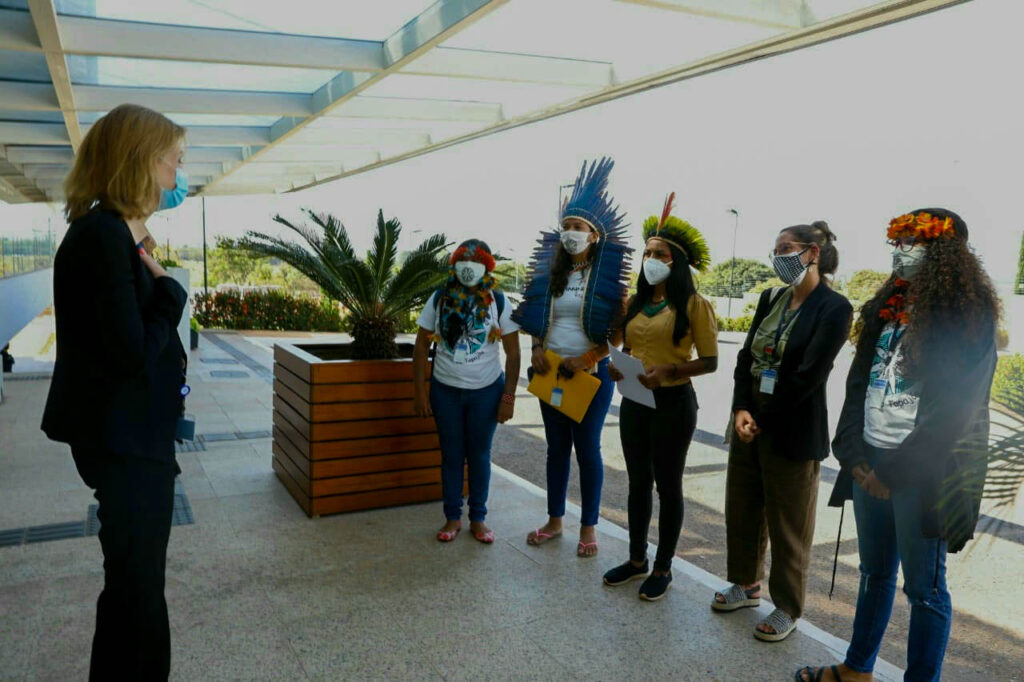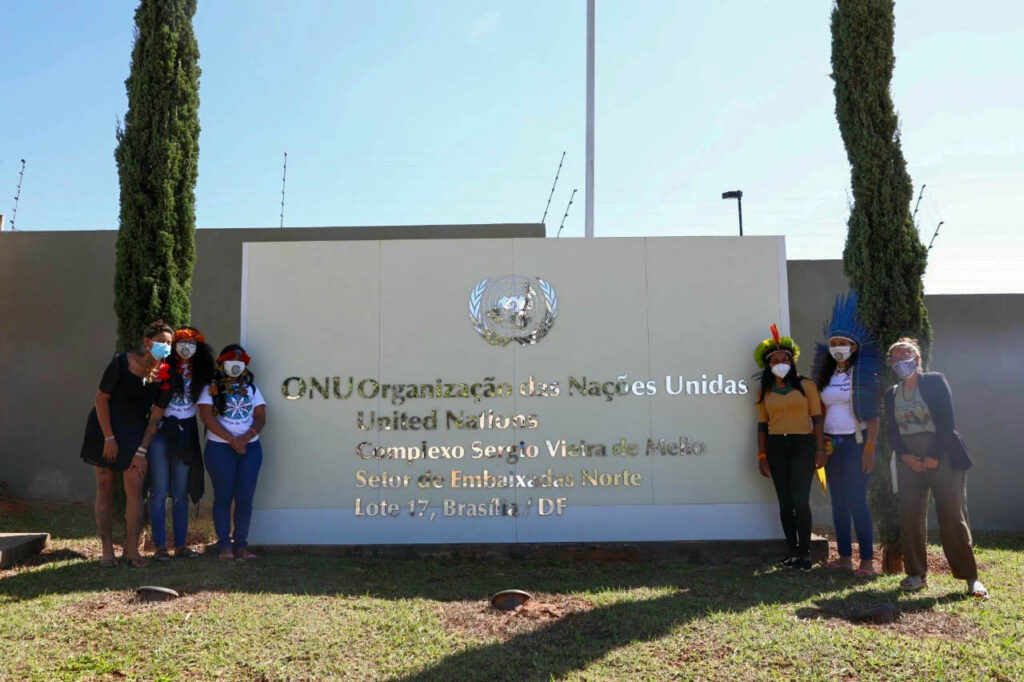Brazilian indigenous Youth represented by Juma Xipaia, Jaciara Borari, Vall Munduruku, Estéfane Galvão, Arewana Juruna and Are Juruna (communicator/photo) delivered a letter with demands and recommendations to the resident coordinator of the United Nations Organization in Brazil, and to the UN Secretary General’s youth advisor, Paloma Costa.
The “Rise for the Earth” is a movement of indigenous leaders from all over Brazil that have gathered in the capital, Brasilia, since June 8th to protest against several projects transiting in the Brazilian congress that attack human rights and also the environmental conservation in Brazil.
Our delegation has been in Brasília since June 15th.
INDIGENOUS YOUTH LETTER TO OUR LEADERS
We, the Indigenous Youth from the “Rise for the Earth” movement, representatives of the Avá Guarani, Acroa, Baré, Gamela Canoe, Cinta Larga, Curuaia, Gavião, Guajajara, Guarani Mbya, Guarani Nhandeva, Imboré, Juruna, Kaingang, Kamakã, Karipuna, Karitiana peoples Kayapó, Krenak Krikati, Macurap, Macuxi, Matupi, Munduruku, Paiter suruí, Panará, Pankara, Pataxó, Pataxó Hã-Hã-Hãe, Sarapá, Tapajó, Terena, Tiriyó, Tukano, Tupari, Tupi Guarani, Tupinambá, Tupinikim Uru eu wau wau, Wapichana, Xarrui, Xipaia, Xokleng, satere mawe, Yanomami, Gurani Kaiowá, Xakriabá, Arapiun Borari, Jenipapu Kanidé, Kaxuyana, Fulni-ô, Arapiun, Apiaká, Arara Vermelha, Kumarari, Jaraki, Mayaki Cara negra, Tapajó, Tapuya, Tupayú present at the Levante Pela Terra mobilization, in June 2021, Brasília – DF, we hereby request support from the leaders and express our concern for the future of all the indigenous peoples of this land who contribute to sustainability and good living on the planet.
Levante Pela Terra (Rise for the Earth) is a mobilization for the Rights of Indigenous Peoples initiated by our traditional leaders and the youth of the Kaingang, Xokleng and Guarani Nhandeva people in the face of setbacks in Social and Environmental Policies and in Human Rights. Together with these relatives and other delegations that came to Brasília in June, we, indigenous youth, feel the duty to be, to be and to add to our leaders who are mobilized in the fight for the right to life and a balanced and healthy Environment for present and future generations.
The Indigenous Youth, present at the Mobilization of the “Rise for the Earth” in Brasília, in June 2021, represented by the Peoples (ethnic groups) mentioned above: come through this, to request urgent support and measures for the Indigenous Peoples and our organizations. We ask ourselves, given everything we have already reported and asked for help, what else do we need to do? For centuries, we have had no peace of mind, even before the pandemic, mainly because our rights have been receded and are constantly under heavy attacks threats. Even so, it is ignored by the justice bodies, including parliamentarians and the Federal Government. Many speak of the impacts, of the genocide on Indigenous Peoples, but in practice we are at the mercy of all kinds of violence and neglect in our territories.
In response, we have sudden and irreversible socio-environmental transformations, as well as non-compliance with the conditions, conflicts and divisions of peoples, in addition to co-optation and corruption, a very high rate of diseases in communities, mining and deforestation, radically altering culture, social and spatial dynamics of indigenous peoples. We feel affronted in our dignity and disrespected in our fundamental rights by the Brazilian State, as it always favors businessmen and private companies, such as the Belo Monte hydroelectric plant, Belo Sun and agribusiness.
We never had, in fact, the Prior and Informed Free Consultation to Indigenous Peoples and guidance regarding the large destruction projects, as well as the Bills, such as PL 490, which is an attempt to retaliate against the rights of the Indigenous Peoples, putting the demarcation and protection of our territories at imminent risk. We hold the Brazilian government and justice bodies accountable for neglecting and ignoring the existing genocide and ecocide. Above all, we make the Brazilian government responsible for any type of violence committed against Indigenous Peoples during the Mobilization of Levante for Land, in Brasília.
We will not submit to forced silencing through intimidation, coercion, corruption, psychological pressure and physical violence. We will continue to defend the freedom, rights and dignity of Indigenous Peoples, as well as minimum security conditions in our sacred territories.
Levante Pela Terra (Rise for the Earth) is a mobilization for the Rights of Indigenous Peoples, initiated by our traditional leaders and the youth of the Kaingang, Xokleng and Guarani Nhandeva people in the face of setbacks in Social and Environmental Policies and in Human Rights. Together with these relatives and the other delegations that came to Brasília in June, we, indigenous youth, feel the duty to be, to be and to add to our leaders who are mobilized in the fight for the Right to Life and the right to an Environment balanced and healthy for present and future generations.
Thus, we indigenous youth present here, propose the following demands to the UN’s International Bodies:
Health
- Reconcile traditional medicine with Western medicine – Support, respect and promote “green pharmacies”, with medicinal plant gardens within the territories and universities with indigenous students;
- Create chronic disease mapping policies to diagnose the prevalence of these diseases and support indigenous families in view of the psychological impact and conditions of access to treatments and medical care;
- Encourage continued training for youth in traditional medicine with masters in traditional health and elders, respecting the culture and identity of each people;
- Create Multidisciplinary Indigenous Traditional Health Centers in territories, hospitals and health posts for short, medium and long-term follow-up of indigenous patients guided by elders and young people trained in the health area, promoting traditional treatments as well as medicinal plants;
- Ensure the participation of indigenous health professionals in indigenous meetings;
Politics
- Provide specific political training for indigenous youth within and outside the territories;
- Carry out joint efforts in communities so that indigenous youth without voter registration cards, identity cards or other official documents can have access;
- Promote instructive lectures on indigenous peoples’ rights and how to access public policies;
- Mapping of young people in communities seeking political education;
- Demand our rights through indigenous parliamentarians who are inserted in Organs competent legislative, judiciary and executive bodies;
- Encourage the creation of applications that convey information on indigenous policies, adapted to traditional languages;
- Support indigenous youth organizations that are within communities that seek together with leaders to create public policies for the well-being of traditional peoples.
Culture
- Churches, especially Christian ones, must respect the traditions of indigenous peoples as well as their way of being and living. There should be no dispute between church and traditional knowledge, this should be an individual choice and not an imposition on the collective;
- Promote cultural recovery as a way to bring the elderly closer and encourage graphics, handicrafts and music, art as resistance;
- Hold intergenerational meetings to promote dialogue, exchange and appreciation of traditional knowledge as well as technological exchange;
- Encourage youth inside and outside the territory to know their roots and not forget them;
- Invest in traditional education and promote the participation of young people.
Territory
- Create strategies to defend our rights over our traditional territories;
- Require the Brazilian state to comply with what is guaranteed in the Brazilian constitution (art. 231, art. 232) and international agreements, such as ILO convention 169 and other international treaties that Brazil is a signatory on the rights of peoples indigenous peoples and the environment;
- Ensure that high demarcated indigenous sacred territories are recognized and respected by the State;
- Encourage the knowledge of youth to be included in the struggle for the demarcation of territories;
- Support indigenous peoples’ internal territorial management projects through self-monitoring of territories;
- Training in territorial management of indigenous youth in the territories, creation of groups of Territory Guardians;
- Encourage and guarantee resources for the reforestation of territories in degraded areas (fires, pastures, loggers and mines), as well as holding the culprits accountable; conquered by the peoples.
Indigenous Education
- Encourage differentiated training for Indigenous Teachers who will act/act within the communities;
- Create specific public examinations for indigenous school education that have specific vacancies for indigenous professionals;
- Strengthen the insertion of traditional knowledge through the PPP (Political Pedagogical Project), as a way to guarantee cultural identity within indigenous schools;
- Demand an increase in the number of places for indigenous people under the Quota Law in public universities and that they present a program to promote the permanence and reception of these students.
Communication/Mobilization
- Create a financial fund so that indigenous youth can participate in movements throughout Brazil and abroad, respecting the youth’s right to speak and prior consultation;
- Encourage meetings of indigenous communicators as a form of workshops for exchanging knowledge among traditional peoples;
- Make tourism viable as a way of disseminating culture, using the different forms of language for communication and to reach the largest audience;
- Use communication tools to fight FAKE NEWS on the struggle of indigenous peoples;
- Encourage the participation of indigenous women communicators so that they occupy more voice and leadership spaces in this environment that is still very much occupied by men;
- Strengthen the communication networks of indigenous organizations and influencers so that they have greater reach, including to the non-indigenous population that is unaware of the diversity and reality of indigenous peoples in Brazil;
- Ensure access to good quality internet and resources for the acquisition of materials as well as for audiovisual projects that encourage the participation of youth from the base;
- Create a system for disseminating notices and projects that facilitates information and participation by indigenous youth;
- Create an audiovisual network of indigenous youth, using communication as a way of decolonizing thought and the stereotype of what the “Indian” would be, in order to show our indigenous cultural and ethnic plurality.
Food
- Encourage the production of healthy food in communities and ensure that the production is used as lunch in indigenous schools. Culinary and food sovereignty must respect the diversity of our peoples;
- Encourage States to guarantee the purchase of food products produced in the village as school lunches, as well as to value our producers and our traditional pesticide-free food;
- Encourage, through projects, the reconnection and consumption of our traditional foods, strengthening the appreciation of culture and food production.
We are the youth of the present and the future, who continue to walk the paths of our ancestors. We live in two worlds, but we do not forget our struggle, it is of extreme importance worldwide, as we are guardian peoples of forests, rivers, deserts, mountains and air. Our traditions are in connection with nature, ensuring continuity and life for our planet and other beings on this Earth and, for all that, we demand respect.
Brasília – DF, June 29, 2021.
Indigenous Youth “Rise for the Earth”:
Associação dos Povos Indígenas na Universidade Federal do Pará -APYEUFPA
União da Juventude Indígena do Médio Xingu – UJIMX
Instituto Juma – IJ
Comissão de Juventude de Indígena do Estado do Ceará – COJICE
Associação indígena tupiniquins de comboios e córrego do ouro ES
Associação de Mulheres Indígenas Suraras do Tapajós
Engajamundo
Associação dos Acadêmicos Indígenas da Universidade de Brasília (AAIUnB)
Coletivo Acadêmico Indígena da Universidade Estadual de Campinas (CAIND Unicamp)
Laklãnõ/Xokleng Santa Catarina.
Wanorī tô wapte Xakriabá
Conselho indígena de Roraima (Cir, núcleo de juventude indígena)



